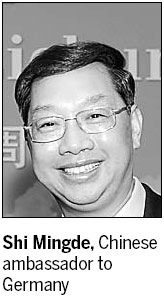Diplomats, analysts blast Tokyo over islands
Senior Chinese diplomats and analysts have warned of Japan's ongoing efforts to "overthrow the postwar international order", with efforts centered around a global campaign challenging China's sovereignty over the Diaoyu Islands.
In the latest round of the escalating drama, Tokyo conducted a military drill on Sunday simulating the capture and occupation of an island territory.
On Monday, Foreign Ministry spokeswoman Hua Chunying responded by saying that "the Chinese side will take firm action if Tokyo employs provocations to escalate the Diaoyu Islands issue."
She said that Japan is defying and challenging the postwar international order as well as the principles of the United Nations Charter, but said such efforts would fail "no matter how Tokyo plots to campaign for its erroneous positions."
In addition to military drills, Tokyo is conducting a multi-pronged campaign to rewrite its military past and lay claim to territories that are historically Chinese, say observers.
Japanese Prime Minister Shinzo Abe made a controversial pilgrimage to the war-linked Yasukuni Shrine in late December, and since then Tokyo has dispatched diplomats to various nations to argue that his visit was justified.
Meanwhile, the Japanese education ministry has made plans to incorporate Japan's claim to the Diaoyu Islands into teaching manuals for the nation's high schools, Japan's NHK national television channel reported on Sunday.

During a visit to Singapore on Monday, Ichita Yamamoto, Japan's minister in charge of ocean policy and territorial issues, repeated Tokyo's position denying the existence of the islands dispute with China.
Zhang Boyu, from the Institute of Japan Studies at the Chinese Academy of Social Sciences, said Abe has shown no signs of relenting in his confrontation with China, and Tokyo will definitely take more measures this year to ramp up its military presence in the East China Sea.
Zhang said Tokyo now firmly believes China to be the main threat to its security.
"By hyping the threat from China, Japan is also trying to get rid of its historical burden as a defeated party in World War II," he said.
Chinese Foreign Minister Wang Yi said in an article published on Sunday that Japan "remains unwilling to face up to its past of aggression" and its leader has gone so far as to pay homage to the Yasukuni Shrine, where 14 Class-A war criminals of World War II are honored.
"Japan's attitude toward its history of militarist aggression contrasts sharply with that of Europe, which made a thorough condemnation of Nazi crimes," Wang said.
The international community needs to remain vigilant and stand firm in defense of human values and the postwar international order, Wang added.
German newspaper Braunschweiger Zeitung published an interview on Friday with Chinese ambassador to Germany Shi Mingde.
In the article, titled Japanese government provoked China, Shi stressed that China does not aim to have confrontations with its neighbors, saying the dispute with Japan is related to Japan's attitude toward its history.
Shi said that Abe's visit to the Yasukuni Shrine can be compared with the idea of a German leader laying a wreath in memory of Hitler. The ambassador said that such a thing would be "unimaginable in Germany".
"With regard to major issues concerning justice and safeguarding the postwar order, we will not make any concessions," Shi said.
Japan's NHK television also confirmed on Monday that the Japanese Defense Ministry might create new deputy posts within the ministry in light of "China's increasing presence in the ocean" and "the worsening security environment".
The new posts would be focused on beefing up communications and strategic dialogue between Japanese officials and their foreign counterparts, NHK said.
Wang Shan, a researcher on Japanese studies at the China Institutes of Contemporary International Relations, said the security of Northeast Asia is now "at considerable risk" and Abe has frequently sent signals to the international community that "tensions are running high between Japan and China".
"Moreover, to secure a high level of public support, Abe seems keen to present himself as tough in his dealings with Japan's so-called rival, China," Wang said.
Support for Abe's government rose 7 percentage points from last month to 62 percent this month, although voters were divided on his Dec 26 visit to the Tokyo shrine, according a poll by Japanese newspaper Yomiuri Shimbun.
Forty-five percent of respondents to the poll, conducted between Friday and Sunday, supported Abe's Dec 26 visit to the shrine, while 47 percent were against it.
zhangyunbi@chinadaily.com.cn
(China Daily 01/14/2014 page11)














